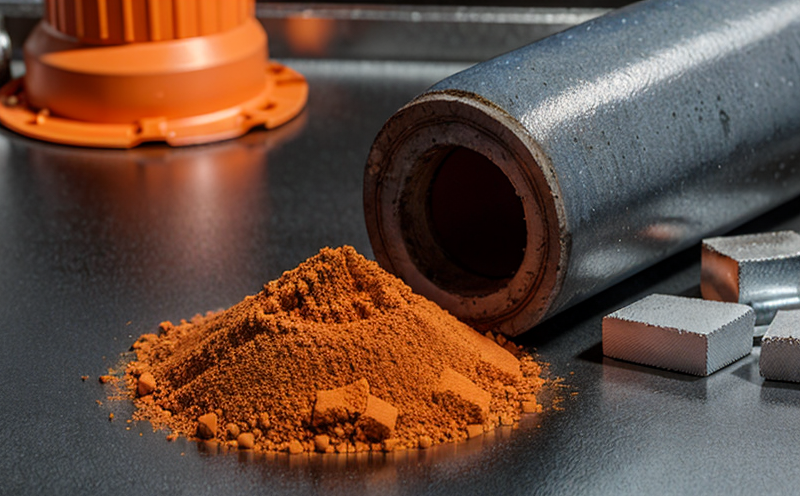Evaluating the stability of materials over time when exposed to chemicals in manufacturing and storage
Evaluating the Stability of Materials A Critical Component in Manufacturing and Storage
As a manufacturer, you understand that the success of your products depends on numerous factors, including their chemical composition, durability, and ability to withstand environmental stressors. However, when it comes to evaluating the stability of materials over time when exposed to chemicals in manufacturing and storage, many companies fall short. This critical aspect of product development can make or break a brands reputation, leading to costly recalls, damaged equipment, and even health hazards.
At Eurolab, we specialize in providing comprehensive laboratory services that help businesses like yours assess the stability of their materials over time when exposed to chemicals. Our cutting-edge facilities and expert scientists work tirelessly to ensure your products meet the highest standards of quality, safety, and performance.
Why Evaluating Material Stability Matters
In manufacturing and storage, materials are constantly subjected to various chemical agents, temperature fluctuations, humidity levels, and other environmental factors that can compromise their integrity. If not properly evaluated, these substances can degrade rapidly, leading to
Reduced product lifespan
Decreased effectiveness or performance
Increased risk of contamination
Enhanced susceptibility to corrosion
Potential health risks for consumers
Moreover, the consequences of ignoring material stability can be severe, including costly recalls, regulatory fines, and damage to your brands reputation.
The Benefits of Using Eurolabs Material Stability Evaluation Services
Our laboratory services are designed to provide you with peace of mind, knowing that your products have been thoroughly tested for their chemical resistance and stability. Here are some key benefits of using our material stability evaluation services
Accurate Predictions Our state-of-the-art facilities enable us to simulate various environmental conditions, allowing us to accurately predict how materials will behave over time.
Enhanced Product Lifespan By understanding the degradation rate of your materials, you can extend their lifespan and reduce waste, leading to cost savings and improved efficiency.
Improved Safety Our testing protocols ensure that products meet or exceed regulatory requirements, reducing the risk of health hazards for consumers.
Increased Efficiency With our help, youll be able to optimize production processes, reduce material usage, and streamline storage and handling procedures.
Competitive Advantage Companies that prioritize material stability gain a significant edge over their competitors, as they can offer longer-lasting products with improved performance.
Key Benefits of Material Stability Evaluation
Reduced risk of product failure
Improved consumer satisfaction
Enhanced brand reputation
Cost savings through reduced waste and optimized production processes
Compliance with regulatory requirements
QA Section Frequently Asked Questions About Material Stability Evaluation
What types of materials can you test?
At Eurolab, we specialize in evaluating the stability of a wide range of materials, including plastics, metals, ceramics, textiles, and composites.
How do you simulate environmental conditions?
Our laboratory facilities are equipped with advanced equipment that allows us to mimic various environmental scenarios, including temperature fluctuations, humidity levels, and exposure to chemicals.
Can you provide a sample report or certificate of analysis?
Yes, our team will provide you with a comprehensive report detailing the test results, as well as any necessary certificates of analysis for regulatory compliance.
How long does the testing process take?
The duration of our material stability evaluation services varies depending on the type and complexity of the tests required. However, most projects can be completed within 2-6 weeks.
Can I trust your results?
Absolutely! Our laboratory adheres to strict quality control measures, ensuring that all test results are accurate, reliable, and unbiased.
Conclusion
Evaluating material stability is a critical component of manufacturing and storage operations. At Eurolab, we understand the importance of providing businesses with reliable, accurate testing services that ensure product quality, safety, and performance. Our team of experts will guide you through every step of the process, from sample preparation to final reporting.
Dont risk your businesss reputation or bottom line by neglecting material stability evaluation. Contact us today to learn more about our comprehensive laboratory services and take the first step towards ensuring the longevity and success of your products.
At Eurolab, were dedicated to helping businesses like yours succeed in an ever-changing market landscape. Trust us to provide you with peace of mind, knowing that your materials have been thoroughly evaluated for their chemical resistance and stability.
-
Testing chemical resistance of materials in various industrial environments
-
Evaluating how different materials react when exposed to specific chemicals
-
Assessing the long-term compatibility of materials with various chemical substances
-
Determining how chemicals affect the physical properties of metals, plastics, and ceramics
-
Simulating material failure under different chemical exposures in manufacturing processes
-
Evaluating the impact of chemical exposure on material integrity in harsh environments
-
Ensuring that chemical formulations do not compromise the strength or performance of materials
-
Assessing compatibility with materials used in packaging, coatings, and containers
-
Testing the impact of aggressive chemicals on seals, gaskets, and other critical components
-
Evaluating the interaction between different chemicals and materials used in consumer products
-
Testing the effect of chemical exposure on elastomers and rubber materials
-
Assessing the compatibility of composite materials with aggressive chemicals used in industrial applications
-
Ensuring that chemicals do not cause degradation or corrosion of equipment, pipelines, or tanks
-
Simulating different chemical exposure scenarios to determine material suitability and durability
-
Testing materials for compatibility with chemicals at different temperatures, pressures, and conditions
-
Evaluating chemical interactions between two or more substances and their effect on material properties
-
Testing the compatibility of materials used in the automotive, aerospace, and medical industries with chemicals
-
Determining the best material choices for applications involving aggressive chemical environments
-
Testing the effects of chemical exposure on surface finishes, including coatings and plating
-
Ensuring the safe use of chemicals in consumer goods by testing material compatibility for health and safety
-
Determining the performance of coatings and films when exposed to various chemicals used in industrial processes




